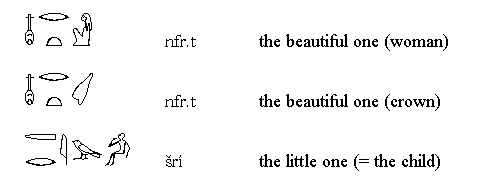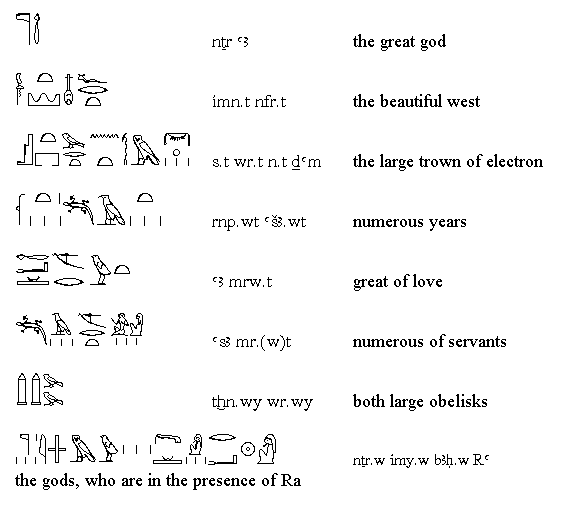The adjective can appear as a substantive, in which case it has all the properties of a regular noun. A determinative sign can be added at the end of the word to further qualify its precise meaning. Some examples are:

The substantivated adjective can be used in a number of ways:
- the adjective can be further qualified by a noun that is written behind it (relative accusative). This construction can be either direct (without a connecting particle) or indirect (with the connective particle "n"). Below you'll find some examples:

- The relative accusative can also appear as a preposition that is placed behind the noun. An example:

- Sometimes the adjective is placed at the beginning of a sentence. In these cases it appears that the adjective is used as a verb. This is not the case however. We are dealing here with a non-verbal construction (the so-called non-verbal sentence, or nominal sentence with adjective predicate). In these cases the adjective is immutable, and does not adapt itself in number of gender to the noun that follows it. An example:


 The Nisbe Adjective
The Nisbe Adjective 
Nisbe adjectives are constructed by derivation from nouns or pronouns, and express a relation to the noun or pronoun from which they are derived. When constructed from masculine of feminine nouns, their meaning translates to something like " in relation with... ", " related to... ". When they are derived from pronouns, their meaning is best translated as " who is in, above, with, behind,... ".
In attributive use, nisbe adjectives adapt in number and gender to the corresponding noun. In substantivated use, they behave as nouns and follow the corresponding rules.
- nisbe-adjective, derived from a pronoun:

- nisbe-adjective, derived from a male noun:

- nisbe-adjective, derived from a feminine noun:


 Vocabulary
Vocabulary 


1997, Egyptologica Vlaanderen VZW
Ancient Greece






 The Nisbe Adjective
The Nisbe Adjective 







